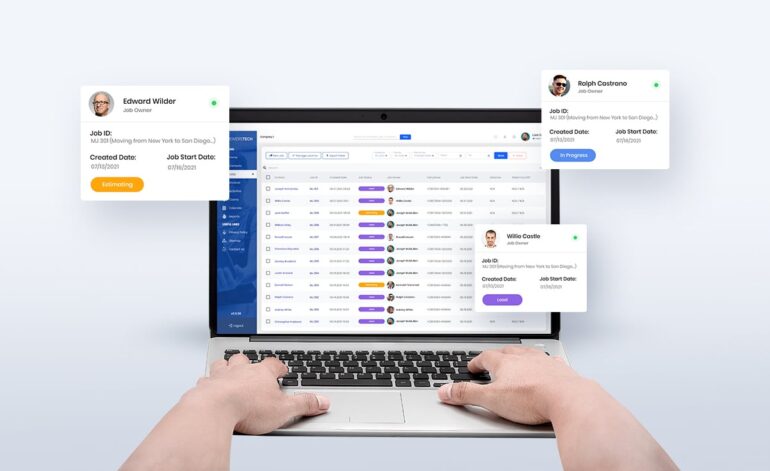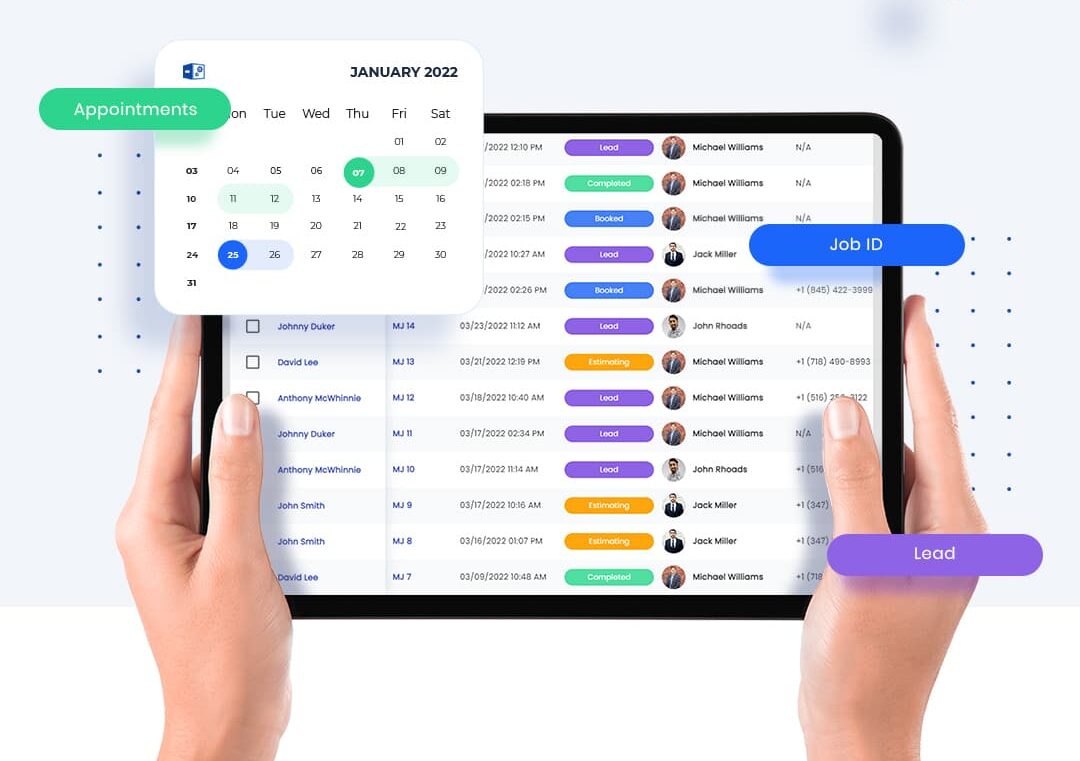In today’s fast-paced world, staying up-to-date with technology is crucial for businesses in every industry, and the moving industry is no exception. As customer expectations evolve and competition grows, moving companies need to adapt to meet the growing need for efficiency and streamlined processes. In a word, you need to implement tech solutions to elevate your moving business. In this blog post, we will explore the importance of staying up-to-date with technology in the moving industry and discuss two key areas of focus: the role of CRM systems and the benefits of going paperless. MoversTech CRM has all the answers. Keep reading and learn how to improve your moving business.

What is the role of CRM systems in the moving industry?
A CRM system is a software solution that enables businesses to manage customer interactions, streamline processes, and enhance overall customer experience. CRM systems provide a centralized platform for storing and accessing customer information, managing communication, and tracking sales and marketing efforts. CRM systems can help moving companies stay organized and efficient. Namely, by implementing a CRM system, you can revolutionize your moving company’s operations. By consolidating customer information in one place, CRM systems allow easy access to important details, such as contact information, move dates, preferences, and special instructions. This accessibility facilitates efficient customer communication, resulting in improved customer satisfaction and loyalty.
To effectively introduce CRM in your moving company, research and selection of a CRM solution tailored to the needs of the moving industry are essential. Factors to consider include functionality, scalability, ease of use, and compatibility with existing systems. Additionally, successful CRM implementation requires proper training for all staff members. By educating employees on how to utilize the CRM system, moving companies effectively can ensure smooth adoption and maximize the benefits of the technology. Also, to optimize efficiency, it is crucial to integrate the CRM system with other business tools and processes such as scheduling, dispatching, and billing. This integration allows for seamless data flow and minimizes manual data entry, reducing errors and saving time.
Recognize the signs that your moving company needs a CRM
Suppose your moving company is struggling to keep track of customer information or experiences challenges in timely and effective communication. In that case, it may be one of the signs your moving company needs a CRM. A CRM can centralize customer data and facilitate efficient communication through various channels. Also, inefficient scheduling and dispatching processes can lead to missed appointments, delays, and dissatisfied customers. A CRM system can provide tools for optimized scheduling and dispatching, enabling better resource management and smoother operations.

In addition to these struggles, if your moving company faces difficulties tracking leads, managing sales pipelines, or implementing targeted marketing campaigns, a CRM system can provide the necessary tools for effective sales and marketing management. It enables lead tracking, automates follow-ups, and provides insights into sales performance. Without proper tracking of performance metrics and analytics, it is challenging to evaluate the success of marketing campaigns, monitor employee productivity, or identify areas for improvement. A CRM system offers robust reporting capabilities, allowing moving companies to gain valuable insights into their operations, so tech solutions to elevate your moving business are a must.
What are the benefits of going paperless for moving companies
In the digital era, there are many reasons why moving companies go paperless. Those that don’t can’t stay competitive in a fast-paced and constantly changing moving market. By going paperless, you get:
- Increased efficiency and organization. Moving companies can streamline their operations and enhance efficiency by eliminating paper-based processes. Digital records, automated workflows, and instant access to information significantly reduce time spent searching for documents and increase overall productivity.
- Reduced environmental impact. Moving companies deal with significant paperwork, from contracts and invoices to inventory lists and customer information forms. Going paperless reduces the reliance on printing and physical storage, contributing to a greener and more sustainable approach. By reducing paper usage, moving companies can minimize their carbon footprint and contribute to environmental conservation.
- Improved data security and privacy. Paper documents are vulnerable to loss, damage, or unauthorized access. Going paperless allows moving companies to implement robust data security measures, such as encryption and access controls, to protect sensitive customer information. Digital records can be stored securely in the cloud or on secure servers, reducing the risk of data breaches and ensuring compliance with privacy regulations.
- Streamlined communication and collaboration among team members. Traditional paper-based communication can be time-consuming and prone to errors. With digital tools and platforms, moving companies can streamline communication and collaboration among team members. Cloud-based collaboration tools allow real-time access to shared documents, facilitating seamless collaboration and reducing miscommunication.
How to successfully transition to a paperless moving company
Implementing electronic document management systems is crucial to transition to a paperless moving company. These systems enable companies to digitize and organize their documents, making them easily accessible and searchable. Moving companies can invest in document management software or utilize cloud-based solutions for secure storage and retrieval of digital documents. Also, digital signatures and contracts streamline the signing process, eliminating the need for physical paperwork. Moving companies can utilize electronic signature platforms that comply with legal requirements to obtain legally binding customer signatures. This saves time and enhances the overall customer experience by reducing the hassle of physical paperwork.

Equipping employees with mobile devices and utilizing industry-specific applications can significantly enhance on-site operations for moving companies. Mobile devices enable real-time access to customer information, inventory lists, and scheduling updates. Moving-specific applications can streamline inventory management, route optimization, and real-time tracking, improving overall operational efficiency. A successful transition to a paperless moving company requires adequate employee training on new digital tools and processes. Companies should invest in comprehensive training programs to familiarize employees with the CRM system, electronic document management systems, mobile applications, and other digital tools. Training should focus on efficient data entry, document management, and utilizing digital tools to streamline operations.
Implementing tech solutions to elevate your moving business is important
The moving industry is rapidly evolving, and you need to keep an eye on moving trends. That means embracing technology is crucial for success in this competitive landscape. Implementing a CRM system allows moving companies to stay organized, improve customer relationships, and optimize sales and marketing efforts. Additionally, going paperless offers numerous benefits, including increased efficiency, reduced environmental impact, enhanced data security, and streamlined communication. As the future of the moving industry continues to be shaped by technological advancements, implementing tech solutions to elevate your moving business will position your company as an industry leader, delivering exceptional services and experiences to your customers.

